Hyundai i30 vs VW ID.7 Touring – Differences & prices compared
Compare performance, boot space, consumption and price in one view.
Find out now: which car is the better choice for you – Hyundai i30 or VW ID.7 Touring?
The Hyundai i30 (Hatchback) comes with a Petrol or Petrol MHEV engine and Manuel or Automatic transmission. In comparison, the VW ID.7 Touring (Estate) features a Electric engine with Automatic transmission.
When it comes to boot capacity, the Hyundai i30 offers 395 L, while the VW ID.7 Touring provides 605 L – depending on how much space you need. If you’re looking for more power, decide whether the 140 HP of the Hyundai i30 or the 340 HP of the VW ID.7 Touring suits your needs better.
In terms of consumption, the values are 5.70 L per 100 km for the Hyundai i30, and 14 kWh for the VW ID.7 Touring.
Price-wise, the Hyundai i30 starts at 24000 £, while the VW ID.7 Touring is available from 47000 £. Compare all the details and find out which model fits your lifestyle best!
Hyundai i30
The Hyundai i30 stands out in the hatchback segment with its sleek design and modern features. It offers a comfortable ride with a well-crafted interior that caters to both driver and passengers. With its emphasis on safety and technology, the i30 provides a balanced driving experience suitable for urban and suburban environments.
details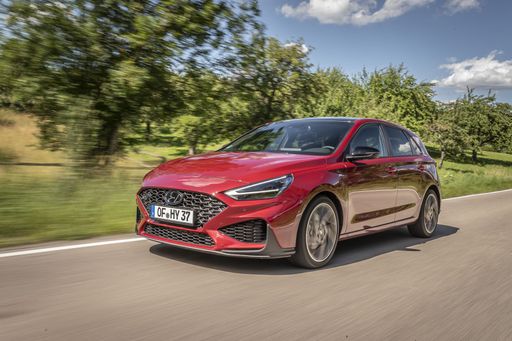 @ hyundai.news
@ hyundai.news
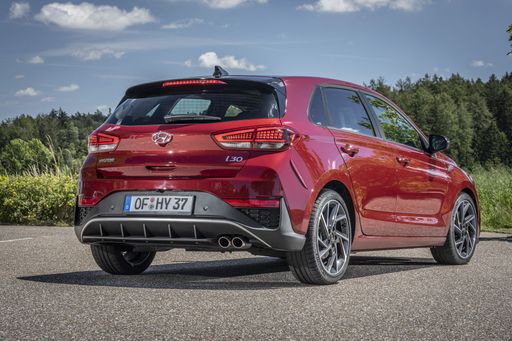 @ hyundai.news
@ hyundai.news
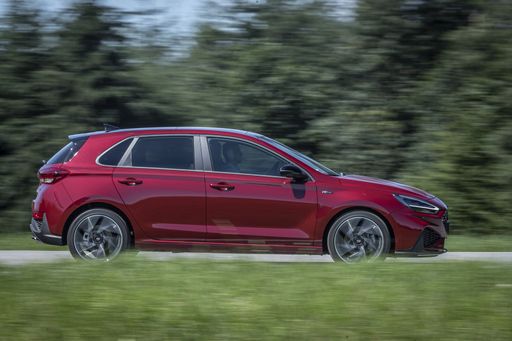 @ hyundai.news
@ hyundai.news
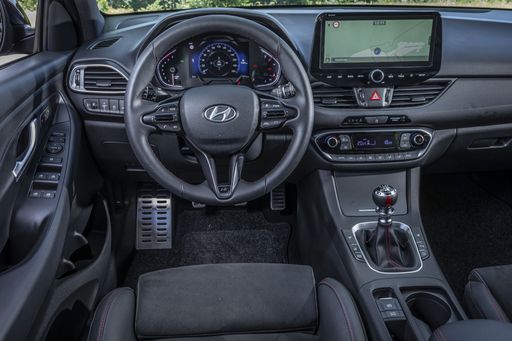 @ hyundai.news
@ hyundai.news
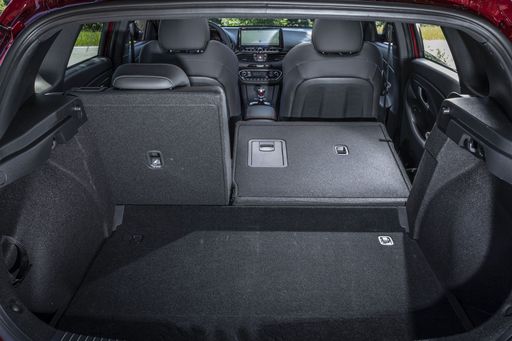 @ hyundai.news
@ hyundai.news
VW ID.7 Touring
The VW ID.7 Touring represents a new chapter in Volkswagen's electric vehicle lineup, offering a seamless blend of style and sustainability. This estate car is designed to provide ample space and comfort for both passengers and luggage, making it ideal for long journeys. With advanced technology features and a focus on eco-friendly performance, the ID.7 Touring is set to appeal to environmentally conscious drivers who don’t want to compromise on practicality or luxury.
details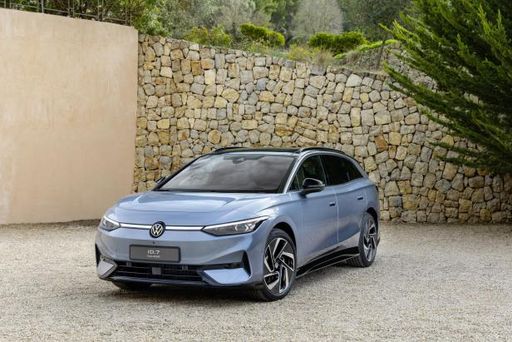 @ Volkswagen
@ Volkswagen
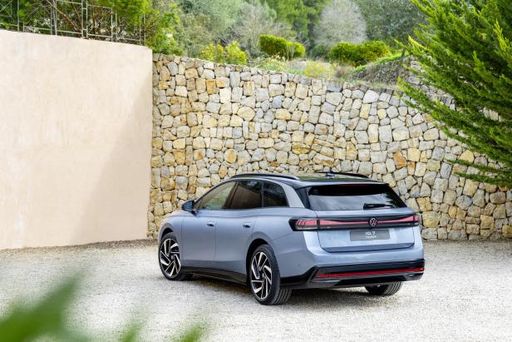 @ Volkswagen
@ Volkswagen
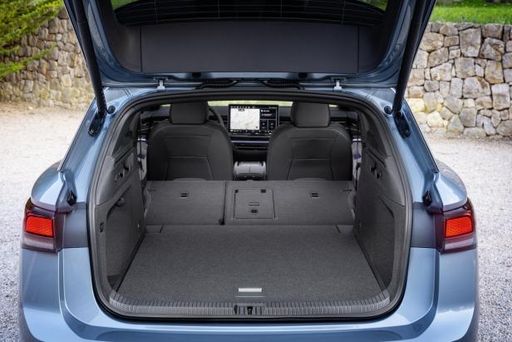 @ Volkswagen
@ Volkswagen

|
 @ Volkswagen
@ Volkswagen
|
|
|
|
Costs and Consumption |
|
|---|---|
|
Price
24000 - 29300 £
|
Price
47000 - 54900 £
|
|
Consumption L/100km
5.7 - 6 L
|
Consumption L/100km
-
|
|
Consumption kWh/100km
-
|
Consumption kWh/100km
14 - 16.6 kWh
|
|
Electric Range
-
|
Electric Range
584 - 690 km
|
|
Battery Capacity
-
|
Battery Capacity
77 - 86 kWh
|
|
co2
130 - 136 g/km
|
co2
0 g/km
|
|
Fuel tank capacity
50 L
|
Fuel tank capacity
-
|
Dimensions and Body |
|
|---|---|
|
Body Type
Hatchback
|
Body Type
Estate
|
|
Seats
5
|
Seats
5
|
|
Doors
5
|
Doors
5
|
|
Curb weight
1291 - 1407 kg
|
Curb weight
2195 - 2339 kg
|
|
Trunk capacity
395 L
|
Trunk capacity
605 L
|
|
Length
4340 mm
|
Length
4961 mm
|
|
Width
1795 mm
|
Width
1862 mm
|
|
Height
1455 mm
|
Height
1549 - 1551 mm
|
|
Payload
463 - 509 kg
|
Payload
455 - 461 kg
|
Engine and Performance |
|
|---|---|
|
Engine Type
Petrol, Petrol MHEV
|
Engine Type
Electric
|
|
Transmission
Manuel, Automatic
|
Transmission
Automatic
|
|
Transmission Detail
Manual Gearbox, Dual-Clutch Automatic
|
Transmission Detail
-
|
|
Drive Type
Front-Wheel Drive
|
Drive Type
Rear-Wheel Drive, All-Wheel Drive
|
|
Power HP
100 - 140 HP
|
Power HP
286 - 340 HP
|
|
Acceleration 0-100km/h
9.6 - 13.1 s
|
Acceleration 0-100km/h
5.5 - 6.7 s
|
|
Max Speed
178 - 197 km/h
|
Max Speed
180 km/h
|
|
Torque
172 - 253 Nm
|
Torque
545 - 679 Nm
|
|
Number of Cylinders
3 - 4
|
Number of Cylinders
-
|
|
Power kW
74 - 103 kW
|
Power kW
210 - 250 kW
|
|
Engine capacity
998 - 1482 cm3
|
Engine capacity
-
|
General |
|
|---|---|
|
Model Year
2024
|
Model Year
2024
|
|
CO2 Efficiency Class
D, E
|
CO2 Efficiency Class
A
|
|
Brand
Hyundai
|
Brand
VW
|
Hyundai i30
Introducing the Hyundai i30: A Blend of Performance and Innovation
The Hyundai i30 continues to impress the automotive world with its fine balance of performance, efficiency, and cutting-edge technology. As a quintessential hatchback, the i30 caters to a diverse range of drivers, offering a remarkable driving experience through its impressive powertrains and compact yet stylish design.
Dynamic Performance Options
At the heart of the Hyundai i30 lies a variety of engine choices designed to suit different driving preferences. The power output ranges from 100 PS to 280 PS, allowing drivers to choose an i30 that perfectly matches their performance needs. Whether you're inclined towards the spirited drive of the N Performance variants or prefer the efficiency of the mild hybrid versions, there’s a powertrain tailored for you.
Innovative Hybrid Technology
For those seeking enhanced fuel efficiency without compromising on power, the i30’s 48V mild-hybrid system offers a compelling option. Available with both manual and automatic transmissions, this innovative technology provides an ideal balance, reducing emissions and improving fuel consumption, with an impressive average of just 5.7 L/100km.
Sophisticated Design and Features
The Hyundai i30’s sleek design is complemented by thoughtful interior features that elevate the driving experience. With a boot space ranging from 395 to 450 litres, this hatchback ensures ample room for all your luggage needs. Furthermore, the car's aesthetic appeal is matched by its practical ergonomic layout, catering to both style enthusiasts and those seeking functionality.
Advanced Safety and Technology
The i30 is equipped with an array of advanced safety features, enhancing driver confidence and ensuring passenger safety. Its cutting-edge safety suite includes lane-keeping assist, forward collision warning, and adaptive cruise control. Additionally, the i30 offers a modern infotainment system, designed to keep you connected and entertained on every journey.
Conclusion: A Versatile Choice for Modern Drivers
The Hyundai i30 is more than just a hatchback; it’s a remarkable amalgamation of power, efficiency, and modern technology. Whether you're enticed by the high-performance models or the eco-friendly mild-hybrid variants, the i30 stands out as a versatile choice that meets the demands of today’s discerning drivers.
VW ID.7 Touring
Introducing the Volkswagen ID.7 Touring: The Future of Electric Estate Cars
The Volkswagen ID.7 Touring signifies a new chapter in VW's electric vehicle evolution, with a focus on combining sophisticated design and cutting-edge technology. As an estate variant of the ID series, the ID.7 Touring offers practicality and superior driving performance with a hint of luxury.
Striking Design: A Blend of Practicality and Elegance
The exterior design of the Volkswagen ID.7 Touring is both striking and functional. Measuring 4,961 mm in length, this estate car offers a spacious interior coupled with aerodynamic efficiency. The sleek lines and contemporary silhouette not only enhance its aesthetic appeal but also improve its performance by reducing drag. With a generous boot capacity of 605 litres, it provides ample space for daily use and long-distance travel.
Power and Efficiency: Driving Performance Unleashed
The ID.7 Touring is powered by a selection of electric motors, offering outputs ranging from 286 to 340 PS, catering to varying performance preferences. With a maximum torque of up to 679 Nm, acceleration is smooth and immediate, with the car achieving 0-100 km/h in as little as 5.5 seconds. The efficient electric drivetrain, coupled with a range of up to 690 km, ensures that long journeys are as enjoyable as they are efficient.
Technological Innovation: The Heart of the ID.7 Touring
At the core of the ID.7 Touring's innovative features is its state-of-the-art infotainment system, seamlessly integrated into the cabin. The intuitive interface supports connected services and advanced driver assistance systems, providing a safe and comfortable driving experience. Enhancements in battery technology allow for rapid charging, making the ID.7 Touring a practical choice for those leading busy lifestyles.
Sustainability and Costs: Electric and Economical
With zero CO2 emissions, the ID.7 Touring is a testament to Volkswagen's commitment to sustainability. The electric estate car falls into CO2 Efficiency Class A, offering an economically efficient driving solution. Operating costs are competitive, with an estimated monthly cost ranging from €1,207 to €1,382, and a cost of €0.483 - €0.553 per km, making it an attractive option for the eco-conscious consumer.
The Future of Estates: Volkswagen Leads the Way
Volkswagen's ID.7 Touring brings the electric estate car into the modern age with a perfect fusion of technology, performance, and design. As one of the most anticipated models of 2024, it sets a high bar for competitors in the electric vehicle market. With the ID.7 Touring, Volkswagen continues to lead the charge towards a sustainable automotive future without compromising style or performance.
The prices and data displayed are estimates based on German list prices and may vary by country. This information is not legally binding.
